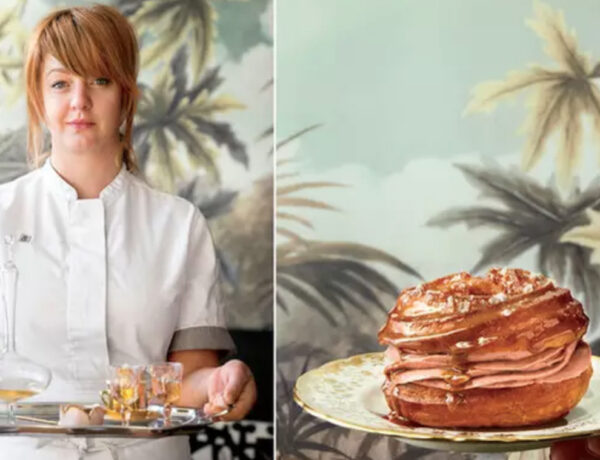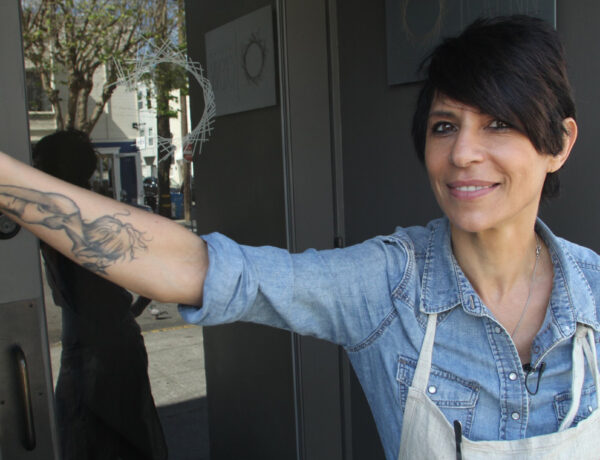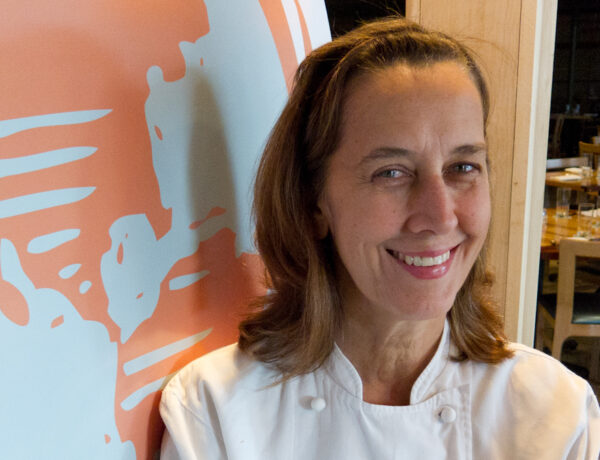Agatha Kavanaugh is the president of One Haus, a national recruitment agency in the hospitality industry. Her unique journey to her position has taken her from being a server at a high-end national restaurant chain, through standing up to the uninvited challenges of gender bias in the male-dominated finance world, to ultimately leading a team of recruiters who place key managers and chefs in demanding restaurant and hotel concepts.
Agatha discusses her views on the current job market as a result of COVID-19, shares her passion on how businesses can increase Diversity, Equity and Inclusion, and offers key advice on how to prepare for an interview.
Let’s start off with a couple of ice breakers for our readers… What’s your favorite topping on toast?
Raw almond butter and dates with Himalayan sea salt and a bit of spicy honey.
If you’re cooking for the one person whom you admire the most, what are you making and why?
This question makes me think of my mom. She cooked and baked everything for my brother and me growing up, never bought a store bought cake or ordered in. She did it with love and discipline. I always felt so nurtured by her cooking. When I’m cooking a special meal for someone I love, I try to infuse it with that same sense of love and effort. I make a vegan bao bun dish with panko crusted tofu, vegan spicy mayo, soy/miso glaze and fresh herbs and pickled radish/daikon that my kids love. It’s not complicated, but it does take a good amount of effort and time. It’s a labor of love.
Let’s get into it.
You initially started on the operations side of the hospitality world. How did you end up becoming the president of a leading recruitment company in the hospitality industry?
I started waiting tables in college with Hillstone Restaurants and became a trainer with them, helping to open locations in Southern California. At the time, I was strongly entertaining law school but ended up shifting away from hospitality and law and fell into the world of high finance where I spent a better part of a decade. I decided to take a break from that world when I had children and was looking for a consulting role or a part-time position where I could impact the growth of a business. Having recruited in the past and through my years of experience taking hard looks at management teams for potential investment, I knew I could help impact a business through talent selection for key roles.
As I was looking at recruitment firms in the corporate sphere, I was introduced to One Haus founder, Mike Hewitt, and really connected to his company vision, his enthusiasm and the startup nature of the business, and I decided to join the team. I was reminded how much I missed the personalities, the tempo and the business of hospitality. From there, I worked hard to expand my depth of knowledge in the industry, to help create systems and SOPs for our growing team, and to help grow the business while also developing my network. I approached everything from the perspective of “how can I do the most ‘good’ for the company, for clients and for candidates?” Over the years Mike has recognized my contributions. So I’m lucky that I found a really good fit.
What has been the biggest accomplishment of your career thus far, and what do you want to achieve next?
I don’t really have a specific milestone to point to. Over the years, I’ve learned to approach each day with the goal “doing good” over doing business. I learned that if the end result of my day means I’ve made a positive contribution to the tasks in front of me, to the people I interact with (team members and clients), to the projects I’m working on, then the business end will be positive as well. I guess you could say it’s a “doing good by doing good work” approach. In terms of my achievements with One Haus, I’m most proud of the team we have today and the reputation our recruiters have helped us build in the market. It’s through the efforts of these individuals and their dedication to helping our candidates and clients that we are who we are today—a national recruitment firm representing some of the world’s best-in-class hospitality groups and talent.
As for the next goal post—I’d like to see us expand our reach, both in terms of industry and geography so that we may help more people and businesses. We’ve recently launched Green Haus by One Haus, focusing on the emerging cannabis industry. I’m very excited by this expansion as I feel there is great crossover with hospitality and the skill sets of people coming out of this sector. We also have some partnerships internationally that I’d like to see further developed.
Can you share a formative moment when you did not succeed? How did it make you feel? What did you take away from the experience to grow?
It was fairly early in my financial services career, I had come up with this idea for a bottled water company (prior to the saturation in this vertical) that had a socially responsible focus on charitable contributions. I had a rough business plan, a company name, a smart tag line, marketing, a core team identified, etc., etc., but I was hung up on two (albeit critical) details of the business. I sat with it for two years trying to figure out the perfect workarounds to these two issues. I let it hang on my shoulders rather than reaching out and up to experts for advice. I thought I had to work it all out before starting the company. It never got off the ground because I was too scared of failing, to looking dumb to investors. Since then I’ve seen companies with similar business models pop up and be very successful. I’ve learned that great ideas without action are of no use. You’ve got to trust yourself and your vision and not be afraid of the work or uncertainty that comes with taking a risk. I’ve also learned that it really does take a team to get things off the ground.
I’ve learned that great ideas without action are of no use. You’ve got to trust yourself and your vision and not be afraid of the work or uncertainty that comes with taking a risk.
Tell us more about how the women in senior positions within your company are positively impacting the company’s vision and/or culture?
Our company is 67% female, with 44% of females in a director-level or higher position. As such, we have a very collaborative and flexible work environment, and one that supports each team member being in control of their workload and schedules so that they are able to focus on child rearing, personal development, travel or whatever the case may be.
How have you had to pivot your company in response to COVID-19? What is the job market looking like currently?
As a recruitment agency, we have been significantly impacted by COVID as many restaurants are not currently hiring due to contraction in business operations resulting from many factors including but not limited to city/state mandated reopening restrictions, loss of funds, permanent closures, etc. We’ve tried to be as supportive as we can to our clients by reducing fees, extending payment timelines, trying to help place displaced workers, etc. We’ve also expanded our footprint into cannabis where we feel like there is an overlap with our talent pool.
With regard to the market outlook, we have begun to see a slight uptick in hiring, but mainly for unit-level positions. That said, we have also seen a lot of job searches starting and then stopping abruptly given the ripple effect of the pandemic. I believe there is a long road ahead to rebound and rebuild. It is expected that we will continue to see fluctuations in the reopening of markets correlated to the spikes in positive COVID cases and hospitalization increases and the resulting state/city/county mandates restricting business operations. Given the slim margins, high operating costs and dependence on consumer discretionary spending, we are in a critical state. Without government assistance to help bolster the industry, we will unfortunately see a lot of business forced to close permanently. On the flip side, businesses that are able to pivot and find new business lines to monetize will likely come out stronger. It will be a new normal. I don’t think we will go back to the way it was before, at least not completely. I think we have another eight to 12 months before us before we begin to see a turn.
You come from a multiracial background. Can you please tell us about your heritage and your upbringing? Was there something unique about your upbringing that could have contributed to how you perceive the workforce, and how you approach it?
Yes, I am biracial, of Asian and Caucasian descent, with one immigrant parent. I grew up in Southern California, in progressive Los Angeles. My father was a blue collar business owner, and my mom was a stay-at-home mom, who was in constant pursuit of higher learning. My parents were very different in how they approached parenting, with my father giving us a wide berth to explore and my mother being very rigid. However, both were focused on education. My mother focused on scholastics while my father focused on street smarts and life skills. Neither of them would accept failure or quitting as an option. I think this is where I get my strong work ethic.
Have you encountered any challenges in the industry because of your gender and/or race? If so, can you speak to some of those and how you addressed them?
Unfortunately, yes, I have encountered challenges stemming from gender and my race, but skewed more heavily towards gender biases. From pay inequality to sexual harassment. In the formative years of my career I accepted the sexual harassment as part of the status quo (I was in the male-dominated, super ego world of high finance) and sought to overcome it by working harder to prove my worth beyond that of a “pretty face.” Later on, I became more vocal and reached out to female mentors and bosses to help me navigate these uncomfortable situations. In time, I learned not to fear retaliation for speaking up and out, and found strength in calling out situations that were inappropriate. I’ve cut ties and turned away business for inappropriate behavior. I won’t stand for it for myself, my teammates or any of the people or businesses I represent.
With the rise of voices calling out for progressive social change, like the #MeToo movement and Black Lives Matter, how can businesses thoughtfully recruit employees?
This is a great question. I think companies really need to assess their hiring practices as well as their company cultures. First, companies need to take a hard look at leadership and make sure that those in charge are really aligned with the company values and mission statement. Culture really is shaped from the top down. It’s important to ensure your company branding and representation is clearly communicated via website, collateral, etc. Secondly, the hiring strategy needs to be evaluated to ensure diversity, equity and inclusion is underpinning the process. This includes targeting diverse talent pools through broad recruiting channels, using inclusive job descriptions and advertisements that employ gender-neutral language among other measures, limiting unconscious/implicit bias in the screening and interviewing process (via blinded resumes and using standardized scorecards when interviewing as examples), to creating programs for development of entry-level employees, and so on. WiHTL in collaboration with PwC and MBS put together an annual report on Diversity and Inclusion within the hospitality, Travel and Leisure (HTL) sector. It’s a really good resource and one I recommend business owners and HR leaders read. It can be found here. It offers some great tips on how to take Diversity and Inclusion from intention to action.
What are you most excited about when it comes to the future of the foodservice industry specifically?
I’m most excited to see how foodservice will innovate and evolve given the many challenges stemming from the COVID pandemic. Specifically, I’m curious to see how restaurant footprints may evolve and how technology will play a part in bridging gaps, and the rise of fast-casual and delivery service segments within the industry. I am looking toward fine dining full service to see how they pivot to recapture market share. We have a lot of talented, brilliant and tenacious individuals in hospitality—I can’t wait to see what they come up with.
As a recruiter, you have a unique position in understanding the point of view of the employer. What advice would you give to those getting ready for an interview?
My simple advice is as follows: 1) Be prepared. Bring copies of your resume, be able to succinctly speak to your work experience, your career development and why you are well positioned for the job as well as why you want to join the company. 2) Do your homework. Research the company and the role you are interviewing for and the people you are meeting (if possible). 3) Be on time, and by on time I mean 10 minutes early. 4) Ask clarifying questions. Interviewing is a two-way street. You should want to assess not only your fit to the role and company culture but the company’s fit for you. Your parting questions can be as important as your answers. 5) Be authentic. Center yourself, calm your nerves, and go into an interview as you are. And smile!
What advice would you give to women who are just getting started in this industry?
As this is still a male-dominated industry, I’d say to women entering the field to think about how you want to be developed. Think about your long-term goals and look at what stepping stones you need to achieve these goals, but don’t be overly rigid in how you get there. Know your worth and set boundaries. Don’t be afraid of self-promotion. Don’t fall into the trap of working harder to prove your worth; work smart. You don’t need to succumb to bro culture to earn respect. Find a network of mentors and advocates and foster those relationships and don’t be afraid to ask for help/guidance. Keep your options open—keep networking.
Know your worth and set boundaries. Don’t be afraid of self-promotion. Don’t fall into the trap of working harder to prove your worth; work smart.
Are there any peers that you particularly admire for having created positive change for women working in food?
There are so many influential women in this industry. Too many to cover, but ones that come to mind are Elizabeth Falkner of WCR, Elizabeth Meltz of Women in Hospitality United, Patricia Duffy of Women You Should Fund, Peggy Berg of The Castell Project, Randi Weinstein of FAB, Beatrice Stein of The Hospitality Project, Lindsey Ofcacek of the Lee Initiative, Vitus Spehar of James Beard Foundation’s Womxn’s Leadership Program, Sarah Rosenberg of Wicked Good Media, Diep Tran of Good Girl Dinette, Lisa Kivirist of In Her Boots. And of course all the women on my team:Tammy Hart, Martha Madison, Hanae Suk, Allyson Emhoff, and Alice Eisenberg.





